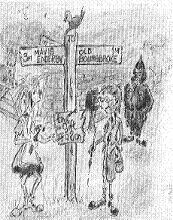Many years ago I watched a re-run of an old BBC programme, an episode of Face to Face, in which famous people of the time - this is late 50s - were interviewed by John Freeman.
This was real interviewing, not the cosy stuff of chat shows or the confrontations which pass for political questioning. It was intelligent, politely probing, confessional conversation. The camera would close in on the sometimes sweating, twitching faces of the interviewees. I remember Tony Hancock chain-smoking, Martin Luther King, like a brick wall, answering each question with a prepared statement, John Huston's easy, anecdotal charm, Edith Sitwell's regal haughtiness, and Bertrand Russell's terrifying intelligence.
Listening to Henry Moore helped me appreciate his sculpture. And Adam Faith, a young Adam Faith, who all but said, 'I know I'm singing a load of crap at the moment, mate, but it's just part of the plan.'
But my most enduring memory - and I'm not even sure this was in the series - was an interview with Ella Fitzgerald. She talked of her deprived, abused childhood and said that it was then that she had discovered Shakespeare. God knows how. She quoted one sonnet in particular and said that when she read it she decided that Shakespeare must have been black, because the words he wrote seemed to describe her condition so exactly.
She was talking about Sonnet 29 and it has to be my own personal favourite, for there have been times in my life when it has articulated my thoughts and given me comfort.
I think I can still quote it from memory:
When in disgrace with fortune and men's eyes,
I all alone beweep my outcast state,
And trouble deaf heaven with my bootless cries,
And look upon myself and curse my fate,
Wishing me like to one more rich in hope,
Featured like him, like him with friends possessed,
Desiring this man's art and that man's scope,
With what I most enjoy contented least.
Yet in these thoughts, myself almost despising,
Haply I think on thee, and then my state,
Like to the lark at break of day arising
From sullen earth, sings hymns at heaven's gate.
For thy sweet love remembered such wealth brings
That then I scorn to change my state with kings.

No comments:
Post a Comment